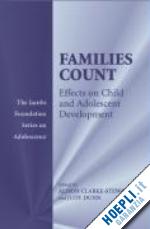Alison Clarke-Stewart is a psychologist whose work focuses on the effects of social environments on children's cognitive and emotional development. Since receiving her Ph.D. from Yale University in 1972, she has studied family interactions, child care, divorce and custody, and children's eyewitness testimony. She is currently a professor in the Department of Psychology and Social Behavior and Associate Dean for Research in the School of Social Ecology, University of California, Irvine. She is a fellow of the American Psychological Association and the American Psychological Society, a member of the Society for Research in Child Development, and a Principal Investigator in the NICHD Study of Early Child Care and Youth Development. She has been a visiting scholar at the Center for Advanced Study in the Behavioral Sciences and at Wolfson College, Oxford University. She has written more than 100 articles for scholarly journals such as Child Development and the American Psychologist and her recent books include What We Know about Childcare (Harvard Press, 2005) and 'Til Divorce Do Us Part (Yale Press, 2006).
Judy Dunn is a psychologist whose research is focused on children's social, emotional and communicative development. She has studied children's family relationships (she pioneered research on siblings) and friendships, stepfamilies, and children's understanding of other people with a particular interest in longitudinal naturalistic observation approaches. She began her research in Cambridge University, spent 8 years in the US, and is currently a professor at the Institute of Psychiatry in London. She is a fellow of the British Academy and of the Academy of Medical Sciences. She has received the Society for Research in Child Development's Award for Distinuished Scientific Contribution and the American Psychological Association's G. Stanley Hall Award. She has been a visiting scholar at the Center for Advanced Study in the Behavioral Sciences at Stanford University, the Van Leer Foundation in Jerusalem, and universities in Italy. She has written scholarly articles and books, including most recently Children's Friendships: The Beginnings of Intimacy (Blackwell Publications 2004).











